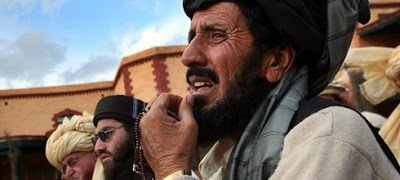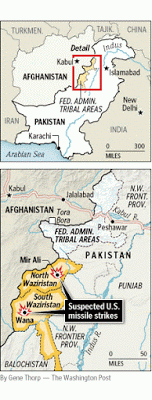Obama bombs Pakistan – from warrantless wiretaps to bombing in countries we are not at war with and who understandably object to this invasion and murder of their people. I am not euphoric yet.
Substitute “Austin” for “Pakistan” in the phrase “missile strikes that killed at least 20 people at suspected terrorist hideouts in northwestern Pakistan”. Personally, I suspect their are plenty of terrorists in Washington D.C.
Alan Pogue / The Rag Blog
Two US Airstrikes Offer a Concrete Sign of Obama’s Pakistan Policy
By R. Jeffrey Smith, Candace Rondeaux and Joby Warrick / January 24, 2009
Two remote U.S. missile strikes that killed at least 20 people at suspected terrorist hideouts in northwestern Pakistan yesterday offered the first tangible sign of President Obama’s commitment to sustained military pressure on the terrorist groups there, even though Pakistanis broadly oppose such unilateral U.S. actions.
The shaky Pakistani government of Asif Ali Zardari has expressed hopes for warm relations with Obama, but members of Obama’s new national security team have already telegraphed their intention to make firmer demands of Islamabad than the Bush administration, and to back up those demands with a threatened curtailment of the plentiful military aid that has been at the heart of U.S.-Pakistani ties for the past three decades.
The separate strikes on two compounds, coming three hours apart and involving five missiles fired from Afghanistan-based Predator drone aircraft, were the first high-profile hostile military actions taken under Obama’s four-day-old presidency. A Pakistani security official said in Islamabad that the strikes appeared to have killed at least 10 insurgents, including five foreign nationals and possibly even “a high-value target” such as a senior al-Qaeda or Taliban official.
It remained unclear yesterday whether Obama personally authorized the strike or was involved in its final planning, but military officials have previously said the White House is routinely briefed about such attacks in advance.
At his daily White House briefing, press secretary Robert Gibbs declined to answer questions about the strikes, saying, “I’m not going to get into these matters.” Obama convened his first National Security Council meeting on Pakistan and Afghanistan yesterday afternoon, after the strike.
The Pakistani government, which has loudly protested some earlier strikes, was quiet yesterday. In September, U.S. and Pakistani officials reached a tacit agreement to allow such attacks to continue without Pakistani involvement, according to senior officials in both countries.
But some Pakistanis have said they expect a possibly bumpy diplomatic stretch ahead.
“Pakistan hopes that Obama will be more patient while dealing with Pakistan,” Husain Haqqani, Pakistan’s ambassador to Washington, said in an interview Wednesday with Pakistan’s Geo television network. “We will review all options if Obama does not adopt a positive policy towards us.” He urged Obama to “hear us out.”
At least 132 people have been killed in 38 suspected U.S. missile strikes inside Pakistan since August, all conducted by the CIA, in a ramped-up effort by the outgoing Bush administration.
Obama’s August 2007 statement — that he favored taking direct action in Pakistan against potential threats to U.S. security if Pakistani security forces do not act — made him less popular in Pakistan than in any other Muslim nation polled before the election.
Secretary of State Hillary Rodham Clinton indicated during her Senate confirmation hearing that the new administration will not relent in holding Pakistan to account for any shortfalls in the continuing battle against extremists.
Linking Pakistan with neighboring Afghanistan “on the front line of our global counterterrorism efforts,” Clinton told the Senate Foreign Relations Committee that “we will use all the elements of our powers — diplomacy, development and defense — to work with those . . . who want to root out al-Qaeda, the Taliban and other violent extremists.” She also said those in Pakistan who do not join the effort will pay a price, adding a distinctly new element to the long-standing U.S. effort to lure Pakistan closer to the West.
In blunt terms in her written answers to the committee’s questions, Clinton pledged that Washington will “condition” future U.S. military aid on Pakistan’s efforts to close down terrorist training camps and evict foreign fighters. She also demanded that Pakistan “prevent” the continued use of its historically lawless northern territories as a sanctuary by either the Taliban or al-Qaeda. And she promised that Washington would provide all the support Pakistan needs if it specifically goes after targets such as Osama bin Laden, who is believed to be using Pakistani mountains as a hideout.
At the same time, Clinton pledged to triple nonmilitary aid to Pakistan, long dwarfed by the more than $6 billion funneled to Pakistani military forces under President George W. Bush through the Pentagon’s counterterrorism office in Islamabad.
“The conditioning of military aid is substantially different,” as is the planned boost of economic aid, said Daniel Markey, a Council on Foreign Relations senior fellow who handled South Asian matters on the State Department’s policy planning staff from 2003 to 2007.
Bush’s focus on military aid to a Pakistani government that was led by an army general until August eventually drew complaints in both countries that much of the funding was spent without accountability or, instead of being used to root out terrorists, was diverted to forces intended for a potential conflict with India.
A study in 2007 by the Center for Strategic and International Studies reported that economic, humanitarian and development assistance under Bush amounted to no more than a quarter of all aid, less than in most countries.
The criticism helped provoke a group of senators who now have powerful new roles — Joseph R. Biden Jr., Clinton and Obama — to co-sponsor legislation last July requiring that more aid be targeted at political pluralism, the rule of law, human and civil rights, and schools, public health and agriculture.
It also would have allowed U.S. weapons sales and other military aid only if the secretary of state certified that Pakistani military forces were making “concerted efforts” to undermine al-Qaeda and the Taliban. In her confirmation statement, Clinton reiterated her support for such a legislative restructuring of the aid program, while reaffirming that she opposed any “blank check.”
Some Pakistanis have been encouraged by indications that Obama intends to increase aid to the impoverished country, said Shuja Nawaz, a Pakistani who directs the South Asia Center of the Washington-based Atlantic Council of the United States. Nawaz said Pakistanis may be willing to overlook an occasional missile lobbed at foreign terrorists if Obama makes a sincere attempt to improve conditions in Pakistan.
“He can’t just focus on military achievements; he has to win over the people,” Nawaz said. “Relying on military strikes will not do the trick.” Attaching conditions to the aid is wise, Nawaz said, because “people are more cognizant of the need for accountability — for ‘tough love.’ “
[Rondeaux reported from Islamabad. Special correspondent Haq Nawaz Khan in Islamabad contributed to this report.]
Source / Washington Post
Thanks to Alan Pogue / The Rag Blog




















WTF, at least El Rushbo is constitutionally qualified to be President!